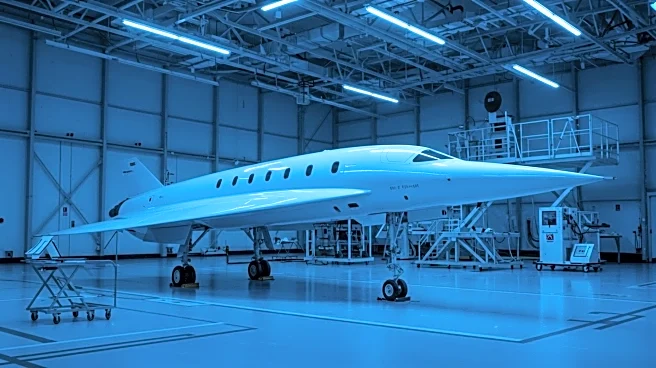What's Happening?
The European Space Agency, in collaboration with UK-based consultancy Frazer-Nash, has announced the Invictus project, aiming to develop a reusable hypersonic 'space plane' capable of traveling from London to New York in just one hour. This ambitious project seeks to surpass the capabilities of the retired Concorde, which operated at Mach 2.04, by achieving speeds of Mach 5, or over 3,800 miles per hour. The Invictus project is centered around the SABRE engine, a dual-mode propulsion system that functions as a jet in the atmosphere and transitions to rocket thrust beyond it. The SABRE engine's precooler technology allows it to manage air temperatures exceeding 1,000 degrees Celsius, enabling efficient and lightweight aircraft operations without heavy oxidizer tanks. The project aims for a first flight by 2031, with a concept demonstrator expected within twelve months.
Why It's Important?
The Invictus project represents a significant advancement in aviation technology, potentially revolutionizing transatlantic travel by drastically reducing flight times. If successful, it could position Europe as a leader in hypersonic travel, challenging the United States' dominance in aerospace innovation. The project's success could have strategic implications, as hypersonic vehicles are of great interest to military applications and could redefine access to orbit. Additionally, the use of hydrogen fuel and advanced ceramic materials in the aircraft design could set new standards for environmental sustainability and structural resilience in aviation.
What's Next?
The European Space Agency has allocated approximately $10 million in seed funding for the Invictus project, viewing it as a technological pathfinder. The next steps involve validating the integration of SABRE's precooler technology, demonstrating thermal resilience at Mach 5, and proving the aircraft's runway reusability. If these milestones are achieved, the project could become a cornerstone of Europe's hypersonic ambitions, potentially leading to further investment and development in both civil and military aviation sectors.
Beyond the Headlines
The Invictus project could have broader implications beyond aviation, influencing global transportation networks and international relations. The ability to travel at hypersonic speeds could transform global connectivity, impacting economic and cultural exchanges. Moreover, the project's focus on sustainable fuel sources and advanced materials could drive innovation in other industries, promoting environmental responsibility and technological advancement.









